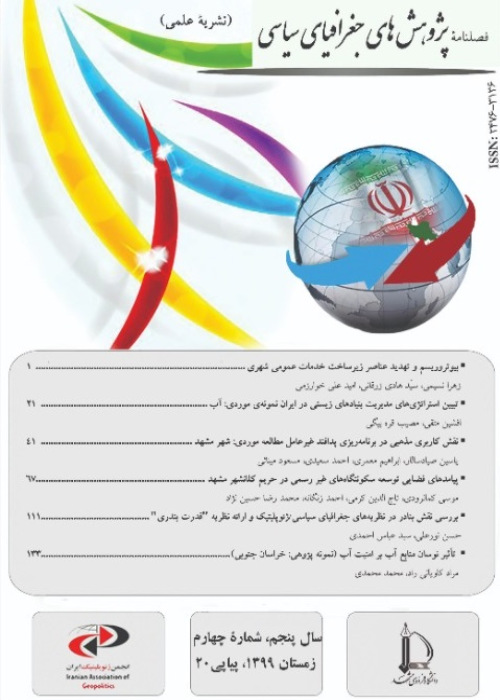Surveying and Analyzing the Geopolitical Interests of Foreign Actors in Syrian Geopolitical Crisis
Author(s):
Article Type:
Research/Original Article (دارای رتبه معتبر)
Abstract:
Introduction
West and Southwest Asia are the most turbulent geopolitical regions of the world. Over the past half century, this region has been the area of competition and the interests of major global and regional powers. Because of the special geopolitical situation in the western part of Syria, the country has become an area of rivalry of powers. The Syrian crisis is different from other crises in the region in terms of gender, causes and outcomes, and the geopolitical factor plays an important role. However, recognizing the geopolitical interests of each of the actors is a key interfere.
Theoretical Framework
Geopolitics is the study of the interactions between geography, power and politics, and the actions arising from the combination of these elements with each other. Geopolitics presents a large picture and proposes a method for linking local and regional developments with the system and the global system as a whole. One of the basic concepts in geopolitics is geopolitical interest, which is supposed geographical and supra-geographical supplements across borders, which are structurally and functionally homogeneous to meet the needs and shortcomings of a country. Geopolitical interest somehow forms the basis of national interests and profits of countries. In geopolitical crises, interventionist countries seek their own national interests, which can be analyzed in the framework of the theory of balance of power. In other words, such countries in a critical geopolitical region are looking for their geopolitical interests based on their national interests; these variables can be analyzed in the framework of the theory of balance of power.
Method
The method used in this research is based on the descriptive-analytic approach and is a type of applied-development research. Regarding the nature and type of subject matter of the study, the collection of data and information has been carried out in a variety of ways and in general based on the library method and has been used from internal and external sources in this field. This research tries to explore the geopolitical interests of the most important actors in the above-mentioned levels in the form of a multi-level model with a descriptive-analytical method.
Results and Discussion
The geopolitical interests of Iran as the most important regional actor are maintaining and expanding the circle of resistance and expanding its geopolitical area in Syria, Iraq, Lebanon and Palestine, destroying the terrorist groups and cutting off their ties with the West-Arab-Turkish axis and defending the Shi'ite ideology. In contrast, Turkey, Saudi Arabia and Israel, with the USA support, are also seeking to reduce the geopolitical and the geostrategic role of Iran and disassociate these resistance movements and their destruction. In addition, on the regional level, Turkey has a dynamic and complex position in its active presence in the West Asia and Syria. However, this instability in the regional policy of Turkey has made a confusion for its geopolitical interests. This has not made Turkey a success in pursuing its other geopolitical interests except for the hydrophilic Forat. Meanwhile, at a global level investigating this geopolitical crisis, Russia seeks to have a naval base and its hegemony overcome in West Asia, and on the other hand, the United States seeks to maintain its own interests in the Middle East and compensate for unsuccessful experiences in Iraq and Afghanistan. Since each of them seeks to increase their global hegemony and expand their perspectives, their geopolitical interests are not close to the Syrian issue.
Conclusion
In the Syrian geopolitical crisis, the most important foreign actors on the regional level are Iran, Turkey, Saudi Arabia, and Israel, and Russia and the United States on the global level. These countries, while having common interests, have their own geopolitical interests. Iran, as one of the most important foreign actors, in addition to its ideological goals in Syria, has sought to achieve such interests as placing the Zionist regime in a geostrategic bottleneck and expanding the area of power of the ring of resistance with the help of Syria, Hamas and Hezbollah in Lebanon. In the end, two points can be acknowledged: firstly, the main source of insecurity in the West and Southwest Asia is the Zionist regime, which, with its unshakable support, is trying to get rid of the geostrategic bottleneck and seeks to eliminate the flow of resistance with the support of the Western-Arab Front. Second, the issue of the Syrian geopolitical crisis, more than any other period in the history of the relations between Iran and Russia, brings together the geopolitical interests of the two countries and directs the two countries from a tactical alliance to a strategic alliance.Keywords:
Language:
Persian
Published:
Research Political Geography, Volume:2 Issue: 4, 2018
Pages:
117 to 143
magiran.com/p2007207
دانلود و مطالعه متن این مقاله با یکی از روشهای زیر امکان پذیر است:
اشتراک شخصی
با عضویت و پرداخت آنلاین حق اشتراک یکساله به مبلغ 1,390,000ريال میتوانید 70 عنوان مطلب دانلود کنید!
اشتراک سازمانی
به کتابخانه دانشگاه یا محل کار خود پیشنهاد کنید تا اشتراک سازمانی این پایگاه را برای دسترسی نامحدود همه کاربران به متن مطالب تهیه نمایند!
توجه!
- حق عضویت دریافتی صرف حمایت از نشریات عضو و نگهداری، تکمیل و توسعه مگیران میشود.
- پرداخت حق اشتراک و دانلود مقالات اجازه بازنشر آن در سایر رسانههای چاپی و دیجیتال را به کاربر نمیدهد.
In order to view content subscription is required
Personal subscription
Subscribe magiran.com for 70 € euros via PayPal and download 70 articles during a year.
Organization subscription
Please contact us to subscribe your university or library for unlimited access!


